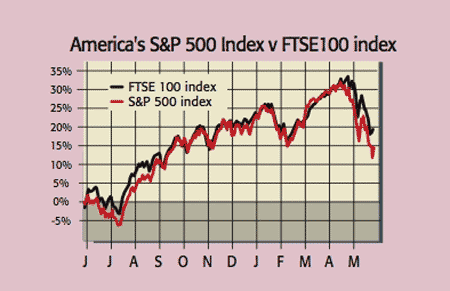Get the latest financial news, insights and expert analysis from our award-winning MoneyWeek team, to help you understand what really matters when it comes to your finances.
You are now subscribed
Your newsletter sign-up was successful
Want to add more newsletters?

Twice daily
MoneyWeek
Get the latest financial news, insights and expert analysis from our award-winning MoneyWeek team, to help you understand what really matters when it comes to your finances.

Four times a week
Look After My Bills
Sign up to our free money-saving newsletter, filled with the latest news and expert advice to help you find the best tips and deals for managing your bills. Start saving today!
"The smell of fear is in the air," said Tom di Galoma of Guggenheim Partners. A wave of risk-aversion swept markets early this week, sending the FTSE below 5,000 for the first time since October. Asian stocks hit a ten-month low. Commodities also tanked, with oil at a three-month low, while gold soared.
The three-month interbank dollar lending rate (Libor) reached a ten-month high. The VIX index, a key gauge of risk-aversion, has risen almost threefold since mid-April. While stocks recovered on Wednesday, the mood remained nervous and the euro stayed close to a four-year low against the dollar.
What the commentators said
This week's turbulence looked "eerily like a repeat" of the time after Bear Stearns collapsed in early 2008 the mounting jitters in the run-up to Lehman's implosion, said Allister Heath in City AM. Investors were panicked by every piece of bad news and there have been plenty of worrying developments. The Korean peninsula may be sliding towards conflict. North Korea has ordered its military to prepare for war after Seoul accused it of torpedoing a South Korean ship. Another element of political risk is uncertainty over US banking regulation and another "useless and counterproductive" attempt by Germany to clamp down on speculators.
MoneyWeek
Subscribe to MoneyWeek today and get your first six magazine issues absolutely FREE

Sign up to Money Morning
Don't miss the latest investment and personal finances news, market analysis, plus money-saving tips with our free twice-daily newsletter
Don't miss the latest investment and personal finances news, market analysis, plus money-saving tips with our free twice-daily newsletter

But the main problem is the eurozone mess, and European banks' exposure to it, as David Wighton pointed out in The Times. The choice is simple and "dismal". Either the peripheral countries get to grips with their debt piles, in which case austerity measures "look likely to tip Europe back into recession". Or they don't, which raises the prospect of "a full-blown euro bust up" and defaults or debt restructurings that could bring Europe's banks to their knees.
Not only do banks have huge exposure to peripheral debt, but they never underwent stress tests like their British and US counterparts, says Hugo Dixon on Breakingviews. So nobody really knows what state their balance sheets are in. Insolvent or badly damaged banks can send shockwaves though the financial system, as we saw when Lehmans collapsed. It's no wonder global banks are becoming increasingly wary about lending to each other. As their funding costs rise, credit will get tighter, damaging growth prospects.
But it's not just the banks' eurozone exposure that worries the markets, said Jeremy Warner on Telegraph.co.uk. It's the threat of a double-dip recession, which would cause "a new round" of bad debts. "Liquidity is being withdrawn in anticipation." The sovereign-debt crisis is threatening to "reinfect the banking sector". Even more worrying, "few if any can afford another round of bank bail-outs".
Get the latest financial news, insights and expert analysis from our award-winning MoneyWeek team, to help you understand what really matters when it comes to your finances.
MoneyWeek is written by a team of experienced and award-winning journalists, plus expert columnists. As well as daily digital news and features, MoneyWeek also publishes a weekly magazine, covering investing and personal finance. From share tips, pensions, gold to practical investment tips - we provide a round-up to help you make money and keep it.
-
 Should you buy an active ETF?
Should you buy an active ETF?ETFs are often mischaracterised as passive products, but they can be a convenient way to add active management to your portfolio
-
 Power up your pension before 5 April – easy ways to save before the tax year end
Power up your pension before 5 April – easy ways to save before the tax year endWith the end of the tax year looming, pension savers currently have a window to review and maximise what’s going into their retirement funds – we look at how

